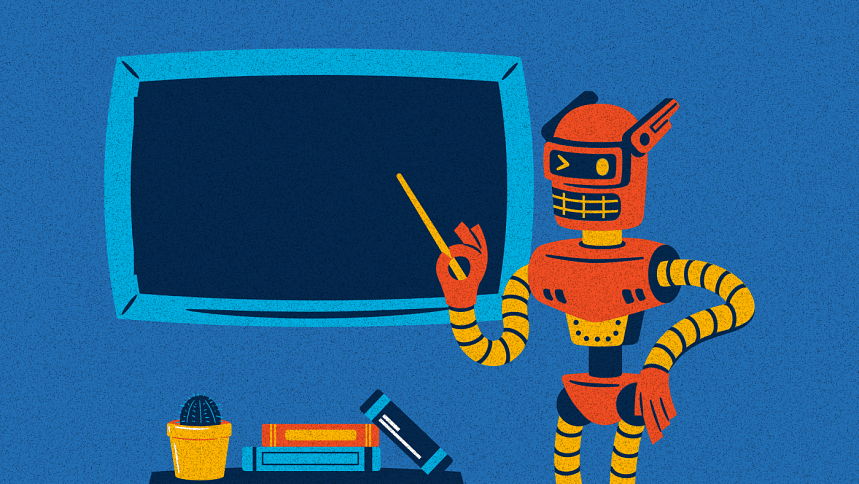Are we learning vocabulary from ChatGPT?

Before 2023, words like 'prowess', 'streamline', 'bolster', and 'nuance' were rarely encountered in everyday English, whether in conversation, professional writing, or mainstream media. Even the use of the em dash (—), a punctuation mark more common in formal prose, was relatively uncommon in day-to-day writing. That began to shift dramatically with the rise of artificial intelligence (AI) tools like ChatGPT. Since its public release in late 2022, ChatGPT has become a digital presence almost everywhere. Whether in school assignments, office work, professional writing, video production, or casual conversations, AI tools like ChatGPT have noticeably changed people's vocabulary and stylistic choices by subtly enriching users' linguistic capacities.
A recent study from the Max Planck Institute for Human Development has revealed a notable increase in the use of certain words frequently found in ChatGPT's output. By analysing over 360,000 YouTube videos and around 771,000 podcast episodes spanning from 2019 to mid-2024, researchers observed a significant rise in the prevalence of words such as 'adept', 'meticulous', 'realm', and 'delve' following the release of ChatGPT in late 2022. These terms also appeared commonly in AI-generated texts during earlier experiments, pointing to a growing influence of the language patterns used by AI tools on human speech and communication.
The findings raise important questions about the ways in which AI is shaping human language, not through direct instruction but through constant passive exposure. The research highlights not only changes in vocabulary but also the possibility of broader shifts in tone and expression. While studies have so far focused primarily on word choice, scientists suspect that AI is also shaping the structure of speech, making it more formal, emotionally restrained, and syntactically ordered: known characteristics associated with ChatGPT's default style.
The influence extends beyond scripted content. Studies at Cornell University, focusing on the use of AI-generated "smart replies" in messaging platforms, have found that while these tools often result in more positive and cooperative interactions, they also create discomfort when users suspect they are being used.
People are also concerned that AI is making different forms of English sound too similar, particularly when it comes to local dialects and informal ways of speaking. Researchers at the University of California, Berkeley, found that ChatGPT and similar models often struggle with dialects such as Singlish or African American Vernacular English. In some cases, the models simply repeated the input without understanding it. In others, they exaggerated the dialect so much that it sounded cartoon-like. The study argues that these are not just technical mistakes but cultural ones, reinforcing a narrow idea of what counts as "correct" or acceptable language.
AI tends to favour certain ways of speaking, which risks reducing the variety of human language. Unique features such as regional expressions, hesitation sounds, and everyday words help build trust between people. As more speakers adopt AI-influenced language patterns, these natural and personal elements may gradually disappear.
Still, there are signs that this trend is not entirely one-way. Some academics and public speakers are reportedly beginning to avoid terms like 'delve' or 'tapestry' precisely because they now feel overused or artificial. This kind of informal resistance suggests that users may eventually push back against the uniformity of AI-generated language.
The path forward is uncertain. As AI systems become more sophisticated, they may begin to reflect a greater range of human expression. At the same time, users will need to make conscious choices about how and when to rely on automated tools.
For writers, educators, and anyone who values originality in communication, this moment represents more than a shift in how we communicate, as it marks a broader cultural inflection point. The question is not just about technological capability, but about human originality. Those who genuinely care about writing and have built their vocabulary through constant trial and error, which includes reading, writing, and constant practice, will likely continue to prefer the authenticity of their own voice over that of an artificial one.
While AI can certainly offer a helpful grammar nudge or suggest an alternative phrase here and there, it can not replicate the subtle satisfaction of finding the perfect word on your own, nor the pride in crafting a sentence that feels entirely yours. In that sense, AI becomes less of a teacher and more of a tool, which is very useful indeed, but never a substitute for the human craft of language.
The bigger question is no longer whether AI will shape the way we write and speak, because it already has. The real challenge is whether individuals can continue to own their own voices. Whether in classroom presentations, dating profiles, or workplace emails, expressing oneself in a truly human way may soon require conscious effort and protection.

 For all latest news, follow The Daily Star's Google News channel.
For all latest news, follow The Daily Star's Google News channel. 








Comments